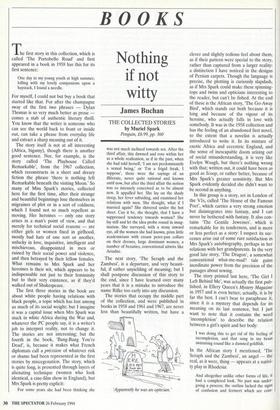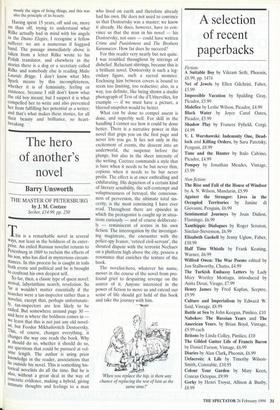BOOKS
Nothing if not witty
James Buchan
THE COLLECTED STORIES by Muriel Spark Penguin, .£6.99, pp. 360 The first story in this collection, which is called The Portobello Road' and first appeared in a book in 1958 has this for its first sentence: One day in my young youth at high summer, lolling with my lovely companions upon a haystack, I found a needle.
For myself, I could not but buy a book that started like that. For after the champagne sway of the first two phrases — Dylan Thomas is so very much better as prose — comes a stab of authentic literary thrill. You know that the writer is someone who can see the world back to front or inside out, can take a phrase from everyday life and extract a sharp meaning out of it.
The story itself is not at all interesting (Africa, bigamy), though there is another good sentence. Nor, for example, is the story called 'The Playhouse Called Remarkable', from the 1967 collection, which reconstructs in a short and dreary fiction the phrase 'there is nothing left Remarkable beneath the visiting Moon.' So many of Miss Spark's stories, collected here for the first time, after their strange and beautiful beginnings lose themselves in migraines of plot or in a sort of coldness, which I found not so much repellent as moving. Her heroines — only one story arises in a man's point of view, and that merely for technical social reasons — are either girls or women fixed in girlhood, mostly bad hats of one sort or another, unlucky in love, inquisitive, intelligent and mischievous, disappointed in men or ruined by their social power and violence, and then betrayed by their fellow females. What remains to Mrs Spark and her heroines is their wit, which appears to be indispensable not just to their femininity but to their very existence, as if they'd walked out of Shakespeare.
The first three stories in the book are about white people having relations with black people, a topic which has lost among us much of its social weight; but I imagine it was a capital issue when Mrs Spark was stuck in white Africa during the War and, whatever the PC people say, it is a writer's job to interpret reality, not to change it. The stories are not interesting; but the fourth in the book, 'Bang-Bang You're Dead', is, because it makes what French diplomats call a precision of whatever risk or shame had been represented in the first stories by miscegenation. The story, which is quite long, is presented through layers of alienating technique (women who look identical, a cine-film show in England), but Mrs Spark is pretty explicit:
For some years she had been thinking she was not much inclined towards sex. After the third affair, this dawned and rose within her as a whole realisation, as if in the past, when she had told herself, 'I am not predominantly a sexual being,' or 'I'm a frigid freak, I suppose', these were the sayings of an illiterate, never quite rational and known until now, but after the third affair the notion was so intensely conceived as to be almost new. It appalled her. She lay on the shady stoep, her fever subsiding, and examined her relations with men. She thought, what if I married again? She shivered under the hot sheet. Can it be, she thought, that I have a suppressed tendency towards women? She lay still and let the idea probe round in imag- ination. She surveyed, with a stony inward eye, all the women she had known, prim little academicians with cream peter-pan collars on their dresses, large dominant women, a number of beauties, conventional nitwits like Ariadne.
The next story, 'The Seraph and the Zambesi', is a departure, and very beauti- ful, if rather unyielding of meaning; but I shall postpone discussion of this story to the end, since I have learned over many years that it is a mistake to introduce the name Rilke too early into any discussion.
The stories that occupy the middle part of the collection, and were published in books in 1958 and 1961 and 1967, are never less than beautifully written, but have a 'Apparently he was an optician.' clever and slightly tedious feel about them, as if their pattern were special to the story, rather than captured from a larger reality: a distinction I have noticed in the designs of Persian carpets. Though the language is precise, the plotting is curiously slapdash, as if Mrs Spark could make these spinning- tops and twins and opticians interesting to the reader, but can't be fished. At the end of these is the African story, 'The Go-Away Bird', which stands out both because it is long and because of the vigour of its heroine, who actually falls in love with somebody. It was in the 1958 collection and has the feeling of an abandoned first novel, to the extent that a novelist is actually introduced to write it. In its mixture of exotic Africa and eccentric England, and the sense of inescapable doom arising out of social misunderstanding, it is very like Evelyn Waugh, but there's nothing wrong with that; written out, it could have been as good as Scoop, or rather better, because of Mrs Spark's greater sensitivity. But Mrs Spark evidently decided she didn't want to be second in anything.
In this group is a story, set in London of the Vls, called 'The House of the Famous Poet', which carries a very strong emotion but disintegrates into fantasy, and I can never be bothered with fantasy. It also con- tains 'The Gentile Jewesses', which is remarkable for its tenderness, and is more or less perfect as a story: I suspect its suc- cesses arise out of some rare satisfaction in Mrs Spark's autobiography, perhaps in her relations with her grandparents. In the very good late story, 'The Dragon', a somewhat conventional what-me-mad? tale gains inordinate power from the precision of the passages about sewing.
The story printed last here, 'The Girl I Left Behind Me', was actually the first pub- lished, in Eller), Queen's Mystery Magazine in 1957 and is even better; actually, it is by far the best. I can't bear to paraphrase it, since it is a mystery that depends for its meaning on its last sentence, but I just want to note that it contains the word 'incompletion' to describe the relation between a girl's spirit and her body:
I was doing this to get rid of the feeling of incompletion, and that song in my brain swimming round like a damned goldfish.
In the African story I mentioned, 'The Seraph and the Zambesi', an angel — the real, as it were, thing — appears at a nativi- ty play in Rhodesia:
And altogether unlike other forms of life, it had a completed look. No part was under- going a process; the outline lacked the signs of confusion and ferment which are corn- monly the signs of living things, and this was also the principle of its beauty.
Having spent 15 years, off and on, more on than off, trying to understand what Rilke actually had in mind with his angels In the Duino Elegies, I recognise a fellow sufferer: we are a numerous if haggard band. The passage immediately above is taken from a letter Rilke wrote to his Polish translator, and elsewhere in the stories there is a dog or a secretary called Rilke and somebody else is reading Make Laurids Brigge. I don't know what Mrs Spark means by this incompleteness, Whether it is of femininity, feeling or existence, because I still don't know what the old boy Meant; but I suspect it is what compelled her to write and also prevented her from fulfilling her potential as a writer; and that's what makes these stories, for all their beauty and brilliance, so heart- breaking.



























































 Previous page
Previous page